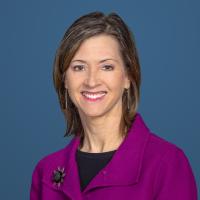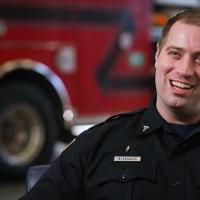Recognizing God as Your Prayer Partner
GOD IS NOT YOUR DENTIST
“There is nothing remotely enjoyable, relaxing, or pleasant about someone cranking open your mouth so they can poke you with sharp metal objects and power tools,” Chad quips.
He humorously uses his aversion to the dentist to illustrate how many people see God – as someone who will criticize and hurt them. “Our beliefs about God – about His character, His attitude toward us, His value system, His desires – shape the premises for our prayers,” Chad says. “The way we see God determines the way we approach God. He’s not your dentist. He’s not your high school principal. He’s not a cosmic police officer.” He reminds us that God is our father, friend, savior, protector, healer, and confidante.
“Similarly, our beliefs about ourselves – our worth, our standing, our potential, our importance – also shape our premises for prayer. The way we see ourselves will influence what we ask for and how we ask it.” Chad lists many truths from Scripture to inform one’s self-view, such as: I am safe ( ), I am always on His mind ( ), I am at peace ( ), I am set free by the truth ( ), I am free from condemnation ( ), and I am God’s handiwork, created to do good ( ).
Praying from the right premises makes all the difference, Chad believes. “If you pray according to the Bible, you’ll pray from the unshakeable premises of God’s love, grace, and calling, not for them. You’ll be bold and confident and full of faith. You’ll ask for anything and pray about everything.”
PRAYER AND PERSPECTIVE
As the title of his book implies, Chad encourages believers to pray about everything. He acknowledges that God is all-powerful, and quite able to change anything, including our circumstances. “But first,” he says, “He changes our perspective. And that changes everything.” When our thoughts, desires, and prayers are not guided by truth, Chad says, our perspective quickly, inevitably becomes skewed. The only way to regain a true and healthy perspective on anything is by seeking God in His Word and prayer.
Chad points to a number of areas in which we all struggle with perspective, including ourselves, pain, sin, enemies, obstacles, material things, and, of course, relationships. Regarding the latter, he explains how prayer alters our perspective: “In prayer, you’ll start to see others the way God does. The quirks and petty offenses will matter less, and their innate value as children of God will take center place. You’ll start to see their gifts, their contributions, their potential. As you take on God’s perspective toward people, you’ll find yourself developing empathy. Prayer humanizes people. This world could certainly use more of that.”
Chad says that God has greatly helped him and Julia see their daughter, Georgia, through His eyes. She was born with a rare brain disorder called lissencephaly, which has severely limited her physical and mental development. “When I prayed for Georgia, I would sense God’s assurance not that she would be healed, but that she wasn’t broken. She was perfect, beautiful, and loved.”
SPIRITUAL BYPASSING
While exhorting us to pray, Chad very insightfully calls attention to a tendency we all have to practice spiritually without also taking needed action. He says it’s called “spiritual bypassing” and defines it this way: “(It) means that instead of paying the price to understand and fix things that are out of alignment in your thoughts and emotions, you try to cover up the issues and move on by ‘praying about it,’ or ‘just having faith,’ or something similar. In other words, we need spiritual practices – but we also need to deal with trauma. We need to understand grief. We need to recognize our weaknesses, addictions, fears, and dreams. We need to take care of entire ourselves: body, soul, and spirit.”
Some of the ways spiritual bypassing plays out in our lives are: avoiding our own pain or trauma, avoiding feeling someone else’s pain, avoiding hard work, protecting the status quo, shifting responsibility, excusing or minimizing our mistakes, and justifying ongoing bad behavior.
Chad admits that it could be easy to engage in spiritual bypassing without even realizing it. To guard against it, he offers these words of advice: “Don’t ignore the warning lights of your heart. Don’t use prayer, faith, or love to mask what’s really going on. Instead, use prayer, faith, love and every other spiritual tool at your disposal to dig deeper into what is really going on, and then get to work on it. Get advice or counseling. Study and learn. Grow in wisdom. Listen to people around you, and listen to the Holy Spirt. Humble yourself and begin to grow. God will bring change and healing if you’re willing to put in the work.”
PRAYER AND MENTAL HEALTH
There have always been more sources of stress in our busy world than anyone can count; all the more so since the pandemic, Chad acknowledges. He points to the rise in anxiety, depression, and other mental health problems which have soared in recent years. “In this crazy world, we long for peace on all levels. We want internal peace and external peace. We want financial peace, physical peace, emotional peace, spiritual peace, family peace, and world peace. We won’t find that peace, though, if we are seeking it in our own strength. The world is simply too big, too far outside our control.” He offers a solution.
“Prayer is not empty words whispered into the wind. It’s not a relaxation technique. Prayer is such a powerful channel of peace because it brings us into the presence of a real, present, caring, active, sovereign God. Prayer leads us to a God whose ways are higher than ours and whose power is greater than ours. It doesn’t bypass our abilities, resources, strength, or wisdom, but it does go beyond them. Prayer reminds us that we don’t have to rely on ourselves to make it through the messiness of life. We are not alone. We are never alone.” Knowing and believing these truths only strengthens one’s mental health, Chad says.




